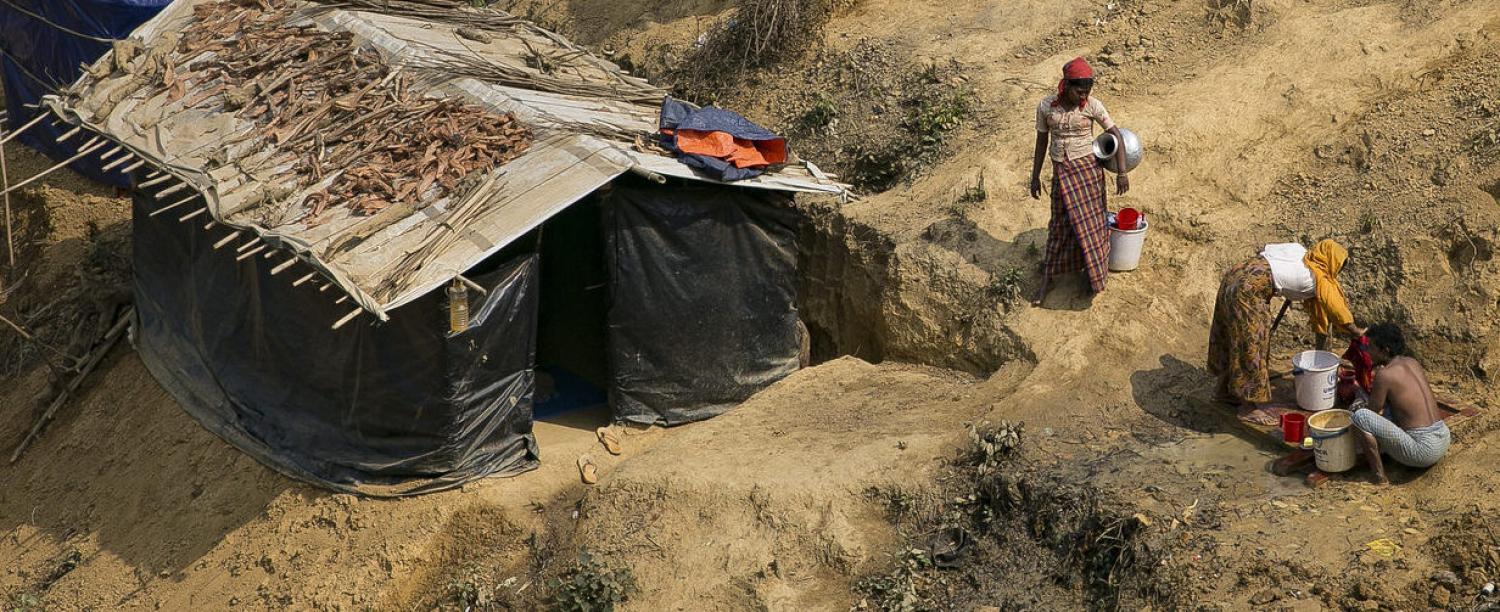Jubaida is one of a million refugees in Cox’s Bazaar, Bangladesh. When she thinks back six months, her memories of playing marbles with friends rest oddly alongside episodes of torture, death, and images of the burning home her family fled.
She is 11. Jubaida, her parents, sister, and three younger brothers trekked for eight days and nights through jungle to reach safety in Bangladesh. They can’t go back. Few have attempted the journey through No Man’s Land. The fate of those who have remains unknown. But staying in Cox’s Bazaar has its own risks, too.
I spoke to Jubaida two weeks ago as she sat crouched between the plastic walls of her family’s hut, a 2 x 4 metre space. This is what “safety” looked like: putrid open drains snaking past homes of flimsy plastic; few safe water wells; and widowed mothers scared to leave their homes to pick up aid packets lest people-traffickers stole their children in their absence.
It will get much worse in the most overcrowded refugee camp on the planet. More than twice the population of Canberra is crammed into an area the size of the beachside Victorian town of Sorrento, and monsoon season is just around the corner, yet governments around the world are failing to actively seek an urgent solution to this direst of refugee crises.
Three quarters of the Rohingyan refugee population have arrived in Cox’s Bazaar since August 2017. They and the longer-term refugees from earlier exoduses are eyeballing the monsoon season, which starts in late March and continues to early October.
What is a humanitarian crisis now will become an unthinkable yet inexorable tragedy as the makeshift camp conditions are battered by the strong winds and heavy downpours of the season. Many people will die – some will drown, and others will perish from a lack of shelter or exposure to diseases from overflowing latrines as hundreds of small hills full of shelters slip and bury families below. The bodies of the already dead, buried shallow and not far from the living, will be exposed in the heavy rain.
If there is no change, no solutions sought, there is no way to avoid this living hell. The crisis is complex and solutions need to be multilayered; however, international governments can act. They can find ways to support Bangladesh, to find solutions to this crisis so that the suffering and deaths of more Rohingyans is averted.
But last weekend a crucial opportunity was missed. The Association of Southeast Asian Nations (ASEAN) met in Australia at a Special Summit. More than at any other time, Prime Minister Malcolm Turnbull had the chance to show leadership in finding a solution to the most pressing of imminent disasters in our region. The conference may be over, but the crisis remains.
Australia’s growing influence in the region should be harnessed to draw support for a solution for the Rohingyan refugees caught without protection or a home.
There needs to be a regional solution, but someone needs to take the lead. This is where Turnbull can turn his words into action. On Monday he met with State Counsellor of Myanmar Aung San Suu Kyi and reportedly offered Australia’s support for a program of resettlement.
But a united approach by ASEAN members and partners to engaging politically with the Government of Myanmar to bring an end to the underlying causes of displacement and provide humanitarian access to Rakhine state is crucial to the success of any durable solution.
While Bangladesh is not an ASEAN member, this does not mean its members shouldn’t urgently seek ways to support Bangladesh to increase help for this displaced population.
In a gesture of regional responsibility sharing, ASEAN countries and their partners, including Australia, could offer to accept a special emergency intake of Rohingyan refugees if Bangladesh facilitates an urgent improvement in camp conditions.
Organisations such as World Vision are reaching thousands of families in the camps by distributing food and shelter items and providing safe spaces for children and women. But so much of our future work hinges on greater support from governments.
I met another woman in Cox’s Bazaar last week. Minara wept as she told me how she had to leave behind the body of her 13-year-old son, Hossenjohar, after he was shot in the stomach as the family escaped last August. She couldn’t pay for a funeral to bury him. The money had to be saved to help her three remaining children flee to Bangladesh. It broke her heart.
Women are suffering depression and mental health issues as a result of the horrors they have witnessed. They are unable to rise and change their circumstances. This is devastating for the next generation of leaders.
Jubaida is an outstanding child leader who to become a teacher and inspire her peers and those following her. But this is out of her reach because of where she is.
There are a million stories like Minara’s and Jubaida’s, a million lives on hold as men, women and children caught between two worlds languish in misery. We need to use our influence to give them a chance to reconstruct their lives. But first we need to save those lives. This need is urgent.

